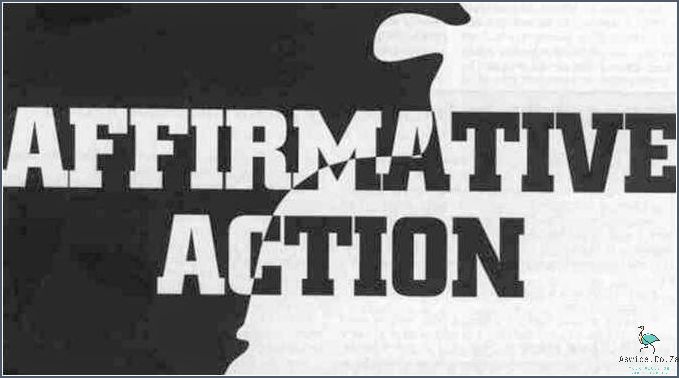
Affirmative Action Policy in South Africa is a policy aimed at addressing the inequities of the past, particularly those faced by the previously disadvantaged communities in the country. The policy seeks to ensure that all South Africans are able to compete on an equal footing in the workplace and other areas of life, regardless of their race, gender, or economic background. The policy has been in place since the 1990s and has seen notable successes in terms of increasing the representation of previously disadvantaged communities in the workplace and in leadership positions. The policy is implemented through a host of legal and administrative measures, such as employment equity, affirmative procurement and tender systems, and targeted training and development initiatives. The ultimate goal of the policy is to create a more inclusive and equitable South Africa, which values the diversity of its people and celebrates the contributions of all its citizens.
Contents
What Is Affirmative Action Policy In South Africa
The Affirmative Action policy in South Africa is a government-backed system of preferential treatment for people from certain groups that were previously disadvantaged through apartheid. This policy aims to ensure that disadvantaged groups receive the same opportunities as other groups in the workplace, in education and in government, while providing a framework in which all South Africans can thrive. The policy is made up of a number of initiatives, such as quotas in the workplace, preferential access to tertiary education and public sector recruitment, and the creation of development funds to support rural and disadvantaged communities. The policy has been instrumental in promoting greater equality in South Africa, and has been widely praised for its effectiveness in promoting non-discriminatory practices.
History of Affirmative Action Policy in South Africa
The history of affirmative action in South Africa is a long and winding one. It began in the late 1970s as a response to the racial discrimination that plagued the country during the apartheid era. The policy was designed to promote equality and ensure fair access to education, employment, and other social services for people of color.
Since its implementation, the policy has been seen as both a success and a failure. On one hand, it has helped reduce discrimination and has granted greater access to people of color in terms of education, employment, and other resources. On the other hand, it has been criticized for perpetuating the cycle of poverty and creating an environment of preferential treatment.
In the early 2000s, the South African government began to focus more on affirmative action and its effects on the country’s economy. The government set up a commission to investigate and review the policy and its effects, and the findings of this commission led to the adoption of a new affirmative action policy. This new policy was designed to encourage greater access to education, employment, and other opportunities for people of color.

The policy has been successful in some areas, such as increased access to education, employment, and other opportunities for people of color. However, it has also been heavily criticized. Critics argue that affirmative action policies can create a culture of preferential treatment and that they can have a negative effect on the overall economy.
Despite the controversy surrounding it, affirmative action is still in place in South Africa, and it remains a contentious issue. It is clear that the policy has had both positive and negative effects on the country, and it is likely that its effects will continue to be debated for years to come.
Benefits of Affirmative Action in South Africa
Affirmative Action in South Africa is a policy designed to promote inclusion in the workplace and to create a level playing field for all citizens. It has been in place since 1994, when the newly formed government adopted it as part of the Reconstruction and Development Plan. The policy is designed to provide opportunities to previously disadvantaged people and to increase job diversity.
There are a number of benefits associated with Affirmative Action in South Africa. Firstly, it encourages diversity and inclusion in the workplace. By promoting access to employment opportunities for previously disadvantaged people, Affirmative Action helps to create a more equitable and diverse workforce. This increases the number of qualified individuals in the workplace, which can benefit both employers and employees.
Secondly, Affirmative Action in South Africa encourages economic growth. By providing more employment opportunities to previously disadvantaged individuals, the policy encourages economic growth. This helps to create a more stable and productive economy, which benefits everyone.
Thirdly, Affirmative Action in South Africa helps to reduce discrimination in the workplace. By promoting a more equitable and diverse workforce, it helps to reduce discrimination based on race, gender, or other factors. This can help to create a more open and tolerant workplace, which can lead to improved employee morale and productivity.
Finally, Affirmative Action in South Africa helps to promote social mobility. By increasing employment opportunities for previously disadvantaged individuals, it helps to reduce poverty and inequality. This can help to improve the quality of life for everyone, regardless of their background or income level.

Overall, Affirmative Action in South Africa is an important policy that can have a positive impact on the economy, society, and the workplace. It encourages diversity and inclusion, helps to reduce discrimination, and can promote social mobility. This makes it an important part of any successful development plan.
Challenges with Affirmative Action in South Africa
Affirmative action in South Africa is a complex and often contentious issue. The policy has been implemented since 1994 in order to address the injustices of apartheid and create a more equitable society. Since then, the policy has been met with both praise and criticism. In this blog, we will discuss some of the major challenges faced with affirmative action in South Africa.
One of the most significant issues with affirmative action in South Africa is the lack of clarity surrounding the implementation of the policy. As the policy is designed to address the effects of apartheid, the parameters of the policy are often open to interpretation. This can lead to difficulties in enforcing the policy and can undermine the intended effect. Furthermore, the policy is also open to abuse. For example, certain individuals may claim to be disadvantaged due to their race in order to receive preferential treatment.
Another challenge with affirmative action in South Africa is the difficulty in determining who is eligible to benefit from the policy. As the policy is designed to address the injustices of apartheid, there is often a lack of clarity around who is eligible for the policy. This can lead to difficulties in determining who should be afforded preferential treatment and can lead to frustration among those who are not eligible for the policy.
Finally, there is the issue of the effectiveness of affirmative action in South Africa. While the policy has been successful in some areas, there is still a significant amount of inequality that remains in the country. This is due to a variety of factors, including a lack of access to resources, a lack of opportunity, and a lack of education. As a result, the effects of the policy may not be as profound as they could be, leading to a feeling of disillusionment among those who are hoping for the policy to bring about positive change.
Overall, affirmative action in South Africa is a complex and often contentious issue. While the policy has been successful in some areas, there are still significant challenges that must be addressed in order for the policy to be effective. These challenges include a lack of clarity around the implementation of the policy, difficulties in determining who is eligible to benefit from the policy, and the effectiveness of the policy in addressing inequality. If these issues are not addressed, then the policy may not be as successful as it could be.
Conclusion
In conclusion, South Africa’s Affirmative Action Policy is a policy that promotes equal opportunity for all citizens regardless of race, gender, or other social factors. This policy is meant to help create a more just and equitable society, where everyone is given a fair chance to succeed and contribute to the country’s economy. This policy is still in its infancy and there is still much work to be done in order to ensure that it is implemented effectively and efficiently. However, it is an important step forward towards a more just society and one that should be respected and supported.




